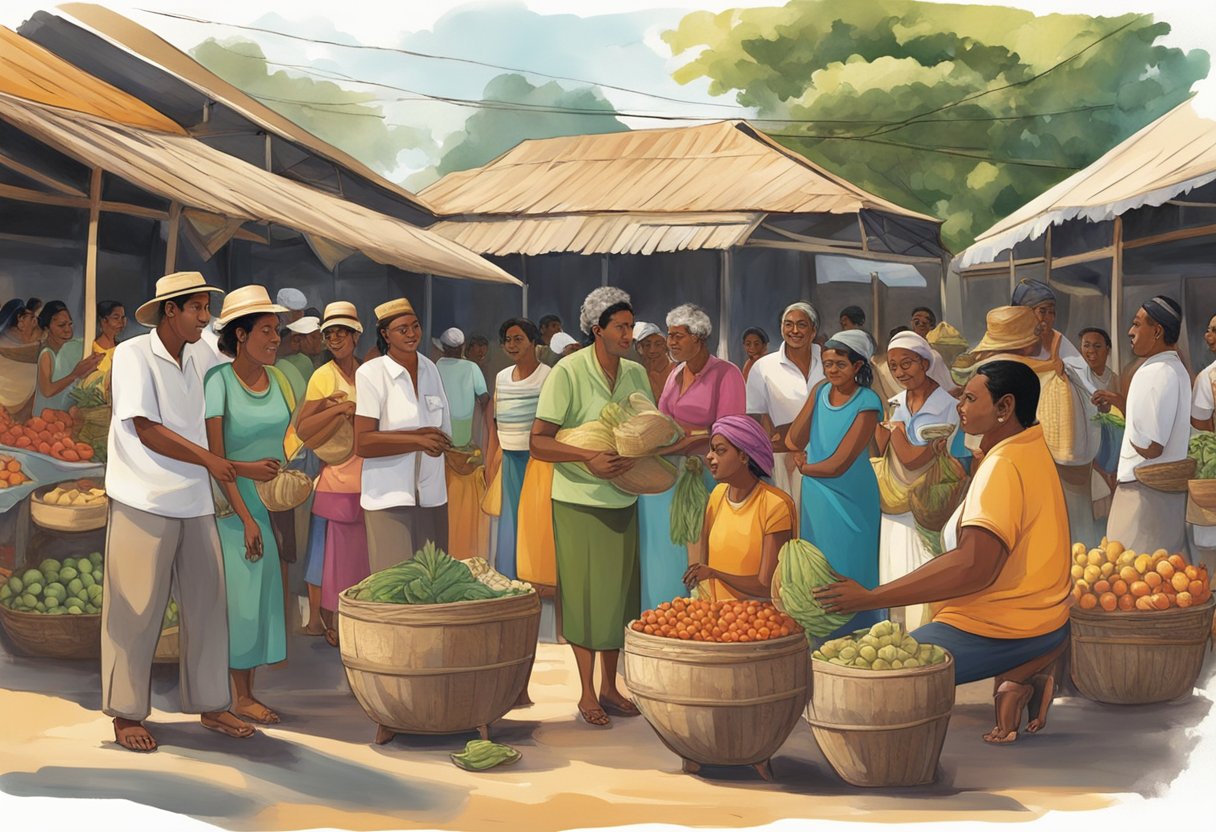The Marginalization of the Creole Community in Mauritius: Challenges and a Path Forward
The Creole community in Mauritius has long been an integral part of the island’s social fabric, yet it remains one of the most marginalised groups in the country. Despite their cultural contributions and deep-rooted presence in Mauritian history, Creoles continue to face systemic challenges that perpetuate a cycle of poverty, social exclusion, and criminality. According to the 2011 Census, the Creole community represents approximately 27% of the population but still struggles with socio-economic disparities compared to other groups in Mauritius.
Understanding the Problems
The marginalisation of the Creole community stems from a combination of historical, economic, and social factors. Over the years, the lack of targeted support and inclusion has resulted in the following challenges:
1. Educational Inequality
Creole communities face considerable barriers to education, with many students dropping out of school prematurely. According to the Ministry of Education in Mauritius, school dropout rates in rural Creole communities are significantly higher compared to urban areas. Data from 2020 shows that in regions like Roche Bois, the dropout rate is as high as 12%, compared to the national average of 4%. This lack of access to quality education perpetuates poverty as the youth are ill-equipped for the modern job market.
2. Poverty and Unemployment
Poverty levels within the Creole community remain disproportionately high. According to a 2019 report by Statistics Mauritius, the unemployment rate among Creoles in rural areas stands at 13%, compared to the national average of 7.1%. This is exacerbated by the limited economic opportunities in rural areas, where many Creoles reside. Families struggle to meet their basic needs without access to stable jobs, leading to economic stagnation within the community.
3. Housing and Living Conditions
Creole families often live in substandard conditions, particularly in rural areas where infrastructure is lacking. According to the Housing and Population Census (2021), approximately 30% of Creole households live in informal or overcrowded settlements without access to clean water or adequate sanitation. The average household size in some of these areas exceeds five individuals per room, further indicating the severity of the issue.
4. Drugs, Crime, and Social Breakdown
Drug abuse and related criminal activities have disproportionately affected the Creole community, with young people being the most vulnerable. The Mauritian Anti-Drug and Smuggling Unit (ADSU) reports that nearly 70% of drug-related arrests in 2022 involved individuals from Creole communities. This statistic underscores the severity of the drug problem, which is often fueled by unemployment and a lack of social services in rural areas. Stigma and stereotypes further compound the issue, labelling Creoles as criminals and exacerbating social exclusion.
5. Health Inequality
Health outcomes are equally concerning, with Creole communities in rural regions having limited access to healthcare services. According to the Mauritian Ministry of Health, approximately 25% of Creoles in rural areas lack access to adequate medical facilities, compared to only 8% in urban regions. As a result, many individuals do not receive timely treatment for conditions such as addiction, mental health issues, or basic medical needs, perpetuating the cycle of poverty and exclusion.
The Role of Faith and a Call for Unity
Most of the Creole community in Mauritius adheres to Christianity, with Roman Catholicism as the predominant faith. Other Christian denominations, such as Pentecostals, Seventh-day Adventists, Anglicans, and Presbyterians, are also present but in smaller numbers. The challenges the Creole community faces are not just social issues—they are deeply intertwined with the fabric of the Church itself.
The Bible teaches that believers are interconnected as one body (1 Corinthians 12:26); thus, the marginalisation and social breakdown within the Creole community cannot be separated from the Church. Regardless of denomination, the Church must act and bring spiritual, social, and economic healing. Faith without works is dead (James 2:26), and the Church must be the guiding force in tackling these issues head-on.
A Comprehensive Response: The ICCCM and AGCCCI Proposal
To reverse the damage and offer a sustainable path forward, the International Christian Chamber of Commerce and Industry Mauritius (ICCCM) and the African Global Christian Chamber of Commerce and Industry (AGCCCI) propose a multi-faceted project aimed at long-term support and opportunities for the Creole community to thrive.
1. Community Support and Empowerment
Education and Skills Development
Education is at the heart of community empowerment, and through the establishment of Community Learning Centres, the ICCCM/AGCCCI will prioritize vocational training and STEM subjects to meet future job market needs. This initiative includes:
- Tutoring Programs: Addressing high dropout rates, particularly in underfunded schools, helping students complete their education.
- Vocational Training: Courses in trades, information technology, and entrepreneurship equip youth and adults alike with marketable skills.
- Scholarship Opportunities: Working with local universities to offer scholarships for higher education and specialized training.
Government Alignment:
- The government provides free education and has expanded technical and vocational training through the Mauritius Institute of Training and Development (MITD). However, there is limited targeting of the Creole community specifically, and the dropout rates in rural areas remain high.
- The government’s STEM initiatives are part of broader educational reforms, but they lack a focus on rural Creole communities, leaving room for improvement in alignment with our goals.
Improving Housing and Infrastructure
The proposal tackles the issue of substandard housing through partnerships with NGOs and government programs to provide affordable housing solutions. Key actions include:
- Constructing new housing units and improving existing infrastructure in Creole-dominant areas.
- Developing essential services such as waste management, clean water, and electricity to enhance the quality of life in these communities.
Government Alignment:
- The Mauritian government has low-income housing schemes under the National Housing Development Company (NHDC) and offers some infrastructure improvement programs. However, delays and quality concerns persist, especially in rural areas. While these efforts align with our goals, the scale and effectiveness need improvement to adequately support the Creole community.
Healthcare Services
Healthcare access will be improved through:
- Community Health Clinics: Offering primary care, addiction recovery programs, and mental health counselling.
- Mobile Health Units: Serving remote areas with health screenings and preventive care.
Government Alignment:
- The government’s public healthcare system offers free healthcare, but rural Creole communities have limited access to specialised care, mental health services, and addiction recovery. Mobile clinics exist but are inconsistent, and the alignment here is partial. Expanding government support in these areas would better align with the proposal’s goals.
2. Economic Empowerment through Job Creation
Entrepreneurship Incubation
ICCCM/AGCCCI will foster entrepreneurship by providing micro-financing, business training, and market access to combat unemployment. This program includes:
- Business Training and Mentorship: Financial literacy, management, and marketing lessons, along with access to mentors.
- Micro-Financing and Grants: Low-interest loans and small business grants to encourage entrepreneurship in key sectors.
- Market Access: Building trade networks for Creole entrepreneurs to sell their goods and services locally and internationally.
Government Alignment:
- The government has initiatives like the SME Development Scheme and the Economic Empowerment Program, which aim to promote entrepreneurship and small business development. However, these programs do not always reach rural Creole communities, and there is a need for more targeted support to align with our goals fully.
Building Strategic Partnerships
The initiative will partner with industries like agriculture, fishing, and tourism to increase employment within these sectors, offering job creation, on-the-job training, and prioritising Creole workers.
Government Alignment:
- The government promotes agriculture and tourism as part of its economic development strategy. However, its efforts do not specifically target the Creole community or rural employment. A stronger focus on employment for marginalised groups like Creoles would better align with our goals.
3. Leadership Development and Moral Guidance
Youth Mentorship and Leadership Programs
Youth will be mentored by church and community leaders to build life skills, spiritual growth, and leadership, ensuring they contribute positively to society and avoid crime. This will be complemented by leadership training that equips young people to advocate for their communities and engage in civic activities.
Community Leadership Training
The project aims to empower local leaders with the necessary skills to mobilise their communities and collaborate with government and business leaders.
Government Alignment:
- The government offers youth leadership and empowerment programs under the Ministry of Youth Empowerment. However, these initiatives lack a religious or moral component, which is central to the ICCCM/AGCCCI proposal. A more faith-oriented and values-driven leadership program would better align with the proposal’s objectives.
4. Rehabilitation and Social Reintegration
Rehabilitation Services
Rehabilitation centers will offer a holistic approach to recovery, addressing physical, emotional, and spiritual aspects of addiction. These centers will provide comprehensive treatment programs and job placement for those who have completed rehabilitation.
Job Placement for Ex-Convicts and Recovering Addicts
Reintegration programs will focus on equipping ex-convicts with marketable skills and connecting them to stable jobs to reduce recidivism.
Government Alignment:
- The government has anti-drug campaigns and rehabilitation programs through the National Rehabilitation Centre. However, these programs are not always comprehensive, and they lack a focused reintegration plan for Creole ex-convicts and addicts. Aligning government efforts with our holistic approach would enhance the impact of these programs.
5. Advocacy and Policy Change
Influencing Government Policy
ICCCM/AGCCCI will advocate for policy changes that address systemic inequalities, particularly in education, housing, healthcare, and employment. Using real-time data from Statistics Mauritius, they aim to influence government policies that will reduce unemployment among rural Creoles from 13% to 8% over the next decade.
Public Awareness Campaigns
Public awareness campaigns will highlight the contributions of the Creole people, fostering cultural pride and promoting unity across ethnic and social lines.
Government Alignment:
- The government has initiated social inclusion policies under the Ministry of Social Integration, but they often fall short of addressing the root causes of Creole marginalisation. Stronger collaboration between the government and ICCCM/AGCCCI’s advocacy efforts could ensure policies better align with the needs of the Creole community.
Conclusion: A Vision for Restoration
The challenges the Creole community faces are deeply rooted in historical marginalisation and systemic inequality. However, the ICCCM and AGCCCI’s proposal presents a comprehensive, faith-based approach that combines education, economic empowerment, moral leadership, and advocacy to bring about lasting change. This project aims to restore dignity, opportunity, and hope to one of Mauritius’s most vulnerable populations by addressing the social and spiritual dimensions of the Creole community’s struggles.
The Church cannot remain passive; it must unify across denominations, as the problems of the Creole community are the problems of the Church itself. The vision for a restored Creole community in Mauritius can become a reality through sustained efforts, partnership with the government, and collective will.



